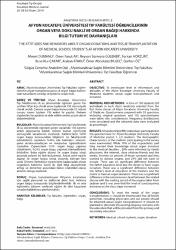AFYON KOCATEPE ÜNİVERSİTESİ TIP FAKÜLTESİ ÖĞRENCİLERİNİN ORGAN VEYA DOKU NAKLİ VE ORGAN BAĞIŞI HAKKINDA BİLGİ TUTUM VE DAVRANIŞLARI

View/
Access
info:eu-repo/semantics/openAccessDate
2019Author
Dumanlı, AhmetAk, Ömer Faruk
Gülener, Reyyan Sümeyra
Horzum, Furkan
Çakar, Buse Nur
Ataklı, Atakan
Bilgeç, Ömer Abdülaziz
Öz, Gürhan
Metadata
Show full item recordAbstract
AMAÇ: Afyon Kocatepe Üniversitesi Tıp Fakültesi öğrencilerinin organ transplantasyonu ve organ bağışı hakkındaki tutumlarını ve bilgi seviyelerini araştırmak. GEREÇ VE YÖNTEM: Afyon Kocatepe Üniversitesi Tıp Fakültesinin ilk üç döneminde öğrenim gören her sınıftan 50’şer kişi olmak üzere toplamda 150 kişi rastgele olarak seçildi. Çalışma organ bağışı konusunda 35 orijinal soruyu içeren toplam 150 anket ile yapıldı. Frekans dağılımları hesaplandı ve elde edilen veriler yüzde olarak değerlendirildi. BULGULAR: Afyon Kocatepe Üniversitesi Tıp Fakültesinin ilk üç döneminde öğrenim gören toplamda 150 öğrenci anket çalışmasına katıldı. Ankete katılan öğrenlerin demografik karakterleri incelendi. Katılımcıların %70’i organ bağışı konusundaki bilgilerini tıp fakültesinde edindiklerini söylerken %30’u aile hekimleri, internet, yakın akraba-arkadaşları ve medyadan öğrendiklerini söylediler. Öğrencilerin %76’ı organ bağışı yapmak istediklerini, %24’ü organ bağışı yapmak istemediklerini bildirdiler. Baba eğitim düzeyi ile organ bağışı isteği arasında anlamlı bir fark bulunmadı. Ancak anne eğitim düzeyi ile organ bağışı isteği arasında belirgin fark vardı. Dönem ilerledikçe öğrencilerin kadavradan alınan organların bekleme süresi ile ilgili bilgi düzeylerinin arttığı ve dönemler arasındaki farkın istatistikel olarak anlamlı olduğu saptandı SONUÇ: Organ transplantasyon ihtiyacını karşılamak için sağlık personeli ve doktorlar dahil tüm halkımız organ bağışı konusunda bilgilendirilmelidir. İlk ve orta eğitimden itibaren verilecek eğitim ile dini kaygıların ortadan kaldırılması planlanmalıdır OBJECTIVE: To investigate level of information and attitudes of the Afyon Kocatepe University Faculty of Medicine students about organ transplantation and donation. MATERIAL AND METHODS: A total of 150 students (50 individuals in each class) randomly selected from the first three classes of Afyon Kocatepe University Faculty of Medicine. Questionnaire prepared with 35 questions including original questions and 150 questionnaires were taken into consideration. Frequency distributions were calculated and the obtained data were evaluated as percentage. RESULTS: A hundered and fifty individuals participated in the questionnaire for Afyon Kocatepe University Faculty of Medicine period 1, 2,3 students. The demographic characteristics of the students participating in the survey were examinated. While 70% of the respondents said they learned their knowledge about organ donation in the medical faculties , 30% were informed by family physicians, the internet, close relatives-friends and the media. Seventy-six percent of those surveyed said they wanted to donate organs, and 24% did not want to donate. There was no significant diffrence between the father education level and the desire to have organ donation. There was a significant diffrence between the father’s level of education of the mothers and the desire to have an organ donation. There was a significant diffrence in the consciousness level between the related classes with the waiting period of the organs taken from cadaver and it was seen that the level of consciousness increased as the class stage increased. CONCLUSIONS: To meet the needs of the organ transplantation; it should be emphasized that all health personnel, including physicians, and our people should be informed about organ transplantation. It should be planned to eliminate the existing religious concerns with the education that will be provided from the primary and secondary education.















